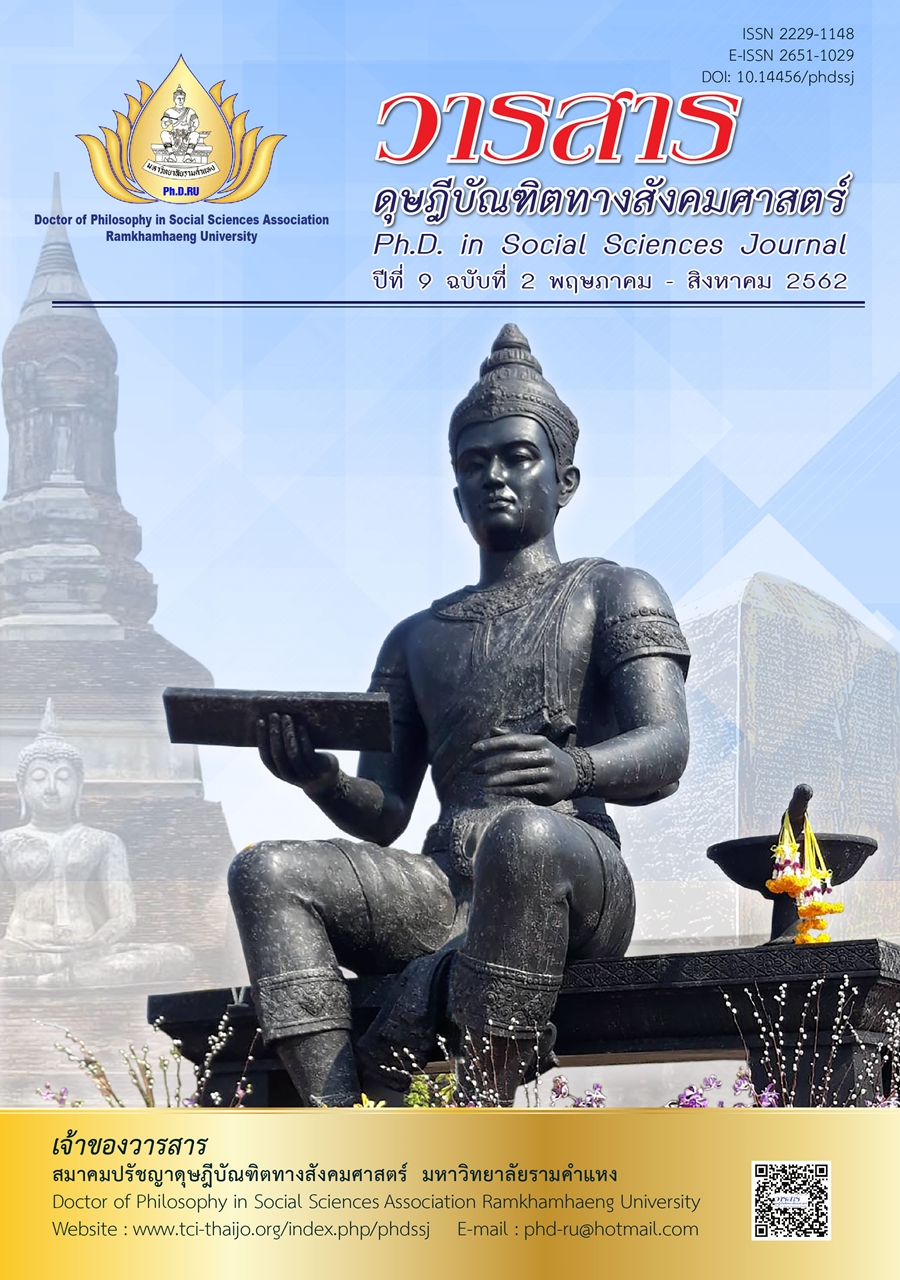Major Factors Influencing the Election of Members of the House of Representatives
Main Article Content
Abstract
The researcher has three objectives: (1) major factors influencing previous decisions for voting for particular candidates for membership in the House of Representatives on July 3, 2011. (2).To study the patterns of voting for the members of the House of Representatives in the northeastern region and (3) To propose guidelines for the development of the election process that is consistent with the election of members of the people of the northeastern region to achieve greater achievement. Adopting a mixed-methods research approach, the researcher employed both quantitative and qualitative research methods in collecting germane data. Data collected from 350 subjects were appropriately analyzed.
Findings are as follows:
Voters were hopeful that political change would follow the election. They embraced the policy and candidate of their favored political party and were desirous of the political party’s leader becoming prime minister. Voters who were educated at the primary school level and who were agriculturalists—the largest political base for their preferred party—took into consideration the benefits to be gained from a policy responsive to their needs. Moreover, the use of marketing procedures in political party electioneering encouraged a positive electoral trend.
It was also found that these voters evinced satisfaction with the successful outcome of the election, especially with the expectation that their favored policies would be implemented. If the policies were effectively implemented, then their problems would be addressed in their view. Therefore, these voters were motivated by having trust and faith in the political party they favored and voted accordingly.
Article Details
Academic articles, research articles, and book reviews in the Ph.D. in Social Sciences Journal are author’s opinions, and not the publisher’s, and is not the responsibility of the Ph.D. in Social Sciences Journal Philosophy Association, Ramkhamhaeng University. (In the case that research is done on human, the researcher has to be trained in Ethics for Doing Research on Human Training and has to produce the evidence of the training).
References
Chueynoo, W. (2014). Political communication and strategies of Mr. Chuwit Kamol Wisit. Master of Political Science, Chulalongkorn University. [In Thai]
Chumphon, P. (2007). Political system: Introduction (9th ed.). Bangkok: Chulalongkorn University Press. [In Thai]
Chumroennitipong, C. (2014). Factors affecting the election of members of the House of Representatives People in the constituency 1, Chonburi province. Master of Arts, Burapa University. [In Thai]
Creswell, J. W., & Plano. C. V. L. (2011). Designing and conducting mixed methods research. Los Angeles: Sage.
DiGrazia, J., & Other. (2013). More tweets, more votes: Social media as a quantitative indicator of political behavior. America Journal of Political Behavior, 8(11), e79449.
Dokthaisong, B. (2009). Democracy ... grass roots. Bangkok: Intellectual Publishing. [In Thai]
Duverger, M. (1972). Political parties. Great Britain: Cambridge University Press.
Holland, A. C., & Kensinger, E. A. (2012). Younger, middle-aged, and older adults’ memories for the 2008 U.S. Presidential Election. Journal of Psychology, 1(3), 163-170.
Kanphinai, A. (2012). Public opinion on election results of members of the Council Representatives in the Bang Nam Priao district area Chachoengsao province: A case study of election, July 3, 2011. Master of Political Science, Burapha University. [In Thai]
Klofstad, C. A., Anderson, R. C., & Nowickl, S. (2015). Perceptions of competence, strength, and age influence voters to select leaders with lower-pitched voices. American Journals of Political Science. 10(8), e0133779.
Kongkirati, P. (2015). Democracy in the transition period: Article on democracy, violence and justice. Nonthaburi: Samesky. [In Thai]
Limmanee, A., & Pimpisuth, T. (1977). Political behavior. Bangkok: Ramkhamhaeng University Press.
McAllister, I. (2016). Candidates and voting choice. Oxford Reseracch Encyclopedias.
Meechan, S. (2012). Election behavior and attitudes towards the vote buying in elections of the eastern provinces: A case of Mahasarakham province. Journal of King Prajadhipok’s Institute, 11(3), 110-128. [In Thai]
Nakata, T. (2012). Thai politics: A system that does not have a formula for solving problems. Bangkok: S. Asia Press (1989). [In Thai]
Nimpanich, C. (2009). Policy analysis, scope, concepts, theories and example cases (8th ed.). Nonthaburi: Sukhothai Thammathirat Open University. [In Thai]
Pholkaset, T. (2013). Voting behavior of members of the House of Representatives in Bangkok: Case study of the electoral district of Don Mueang, 16 June 2013. Master of Political Science, Ramkhamhaeng University. [In Thai]
Plano, J. C., & Greenberg. (1985). The American political dictionary (7th ed.). Host: Rinehart and Winston.
Raccuia, L. (2016). Single-Target Implicit Association Tests (ST-IAT) predict voting behavior of decided and undecided voters in Swiss referendums. PLOS ONE, 11(10), e0163872.
Rutchattranon, W., & Akhaad, N. (2012). The popularity of Isaan people towards the Phuea Thai Party: A case study of Khon Kaen province. Journal of Political Science Review, 1(1), 76-78. [In Thai]
Sertsri, K. (2010). Comparison of voting behavior between voters in general election and re-election: Case study Mae Tha district Lamphun Province. Master of Arts, Chiang Mai University. [In Thai]
Snyder, R. E. (2011). The impact of age, education, political Knowledge and political context on voter turnout. Las Vegas: University of Nevada.
Supharp, S. (2014). Factors affecting the decision to vote for election of members of the Representatives Council: Case study of the 1st constituency, Sisaket Province. Master of Public Administration, Sisaket Rajabhat University. [In Thai]
Walter, K. (1978). The working class in welfare capitalism. London: Routledge & Kegan Paul.
Watsanawin, S. (2011). The opinion of public about factors affecting the Voting for the House of Representatives, District 1, Chanthaburi Province on July 3, 2011. Master of Public Administration, Burapa university. [In Thai]
Winitchakun, T. (2013). Democracy with a king over politics. Nonthaburi: Samesky. [In Thai]
Woraphan, D., & Others. (1992). Political parties and communication behavior during general election campaign 1992. Bangkok: Thammasat University. [In Thai]


